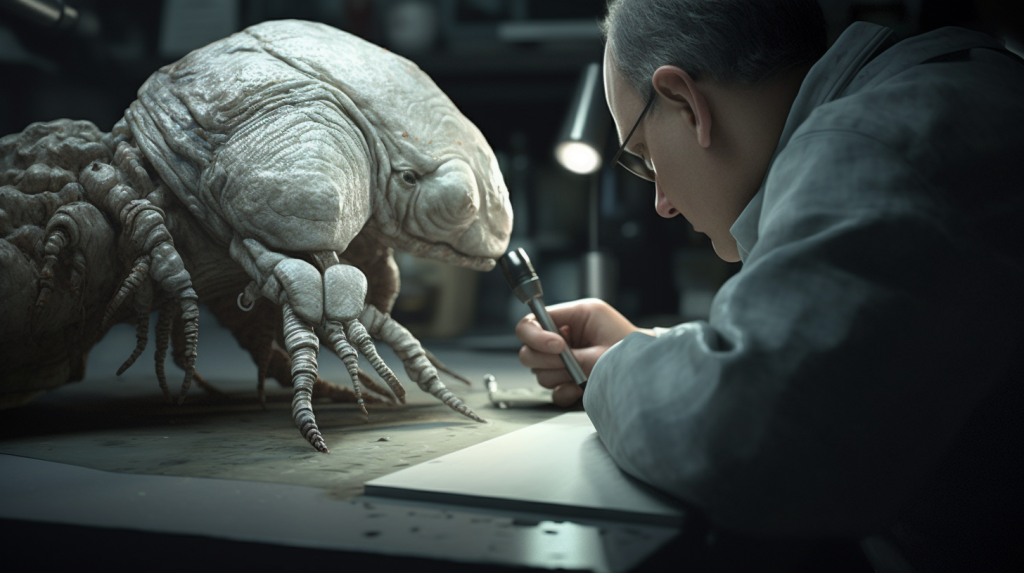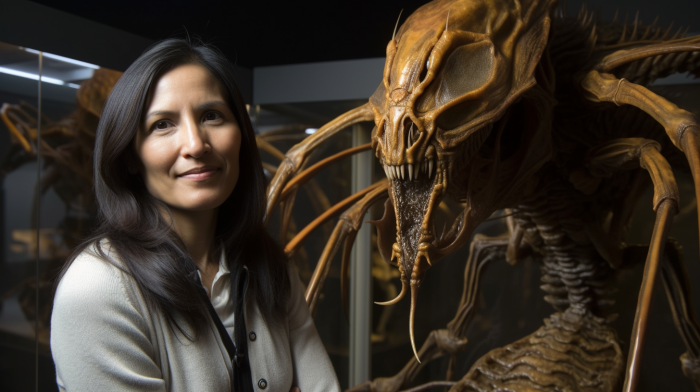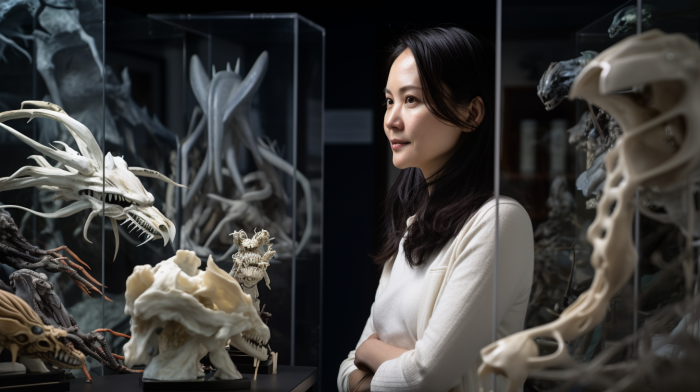A DISCUSSION OF THE ETHICAL CONSIDERATIONS THAT ARISE WHEN STUDYING AND INTERACTING WITH INTELLIGENT OR POTENTIALLY SENTIENT ALIEN SPECIES
Studying and interacting with non-humanoid aliens is a fascinating field of study that raises many ethical considerations. As the Xenobiology Museum focuses on the zoology of non-humanoid aliens on a zoological perspective, the ethics of studying and interacting with these creatures must be discussed. This article aims to explore the ethical implications of studying non-humanoid aliens and the responsibilities of researchers in this field.

DEFINING NON-HUMANOID ALIENS
Non-humanoid aliens are creatures that are not humanoid in form, meaning they do not have the same physical characteristics as humans, such as a head, torso, and limbs. These creatures come in a wide variety of shapes and sizes, and may possess very different sensory abilities, modes of communication, and ways of thinking compared to humans. As such, studying these creatures requires an open mind and an appreciation of the vast diversity of life in the universe.
THE ETHICAL IMPLICATIONS OF STUDYING NON-HUMANOID ALIENS
Studying non-humanoid aliens can raise many ethical concerns, especially when dealing with potentially sentient or intelligent creatures. There are several key ethical considerations that must be taken into account when studying and interacting with these creatures:
- Respect for life: As with all forms of life, non-humanoid aliens deserve respect and protection from harm. Researchers must be mindful of the potential impact their studies may have on the creatures they are studying.
- Non-interference: Some argue that we should not interfere with the lives of non-humanoid aliens, especially those that are intelligent or sentient. Interfering with their way of life could be seen as a violation of their autonomy and dignity.
- Informed consent: In cases where researchers are interacting with intelligent or sentient non-humanoid aliens, it is important to obtain their informed consent. This can be a difficult task, as it requires the ability to communicate with the aliens and ensure that they fully understand the implications of their participation in the study.
- Avoiding harm: Researchers must take great care to avoid causing harm to the non-humanoid aliens they are studying. This includes both physical harm and psychological harm, such as stress or trauma caused by the research process.

RESPONSIBILITIES OF RESEARCHERS IN STUDYING NON-HUMANOID ALIENS
Researchers have a responsibility to ensure that their work is conducted in an ethical and responsible manner. This includes taking steps to mitigate any potential harm to the non-humanoid aliens they are studying, as well as respecting their autonomy and dignity.
- Develop communication methods: Developing effective methods of communication with non-humanoid aliens is key to obtaining their informed consent and ensuring that their needs and preferences are taken into account. This can be a challenging task, as non-humanoid aliens may have vastly different ways of communicating compared to humans.
- Minimize harm: Researchers must take steps to minimize any harm that may be caused to the non-humanoid aliens they are studying. This includes avoiding any unnecessary invasive procedures, minimizing stress and trauma caused by the research process, and ensuring that the aliens are kept in appropriate living conditions.
- Ensure ethical oversight: Researchers must ensure that their work is subject to ethical oversight, either by an internal review board or an external regulatory body. This oversight helps to ensure that the rights and welfare of the non-humanoid aliens are protected.
- Share knowledge and data: Researchers have a responsibility to share their knowledge and data with the wider scientific community. This helps to ensure that research is conducted in a collaborative and transparent manner, and that the benefits of the research are shared with society as a whole.
THE VOICE OF THE XENOBIOLOGY MUSEUM RESEARCHERS

Dr. Tanya Singh, founder of the Xenobiology Museum, emphasizes the importance of ethical considerations in our work: “As scientists, we have a duty to study and preserve the diversity of life in the universe, but we must do so with respect and humility. We must recognize that the non-humanoid aliens we study are living beings, and we must treat them with the same care and compassion that we would give to any other animal.”
Dr. Mei Ling, lead xenobiologist and curator at the museum, echoes this sentiment: “We must always remember that we are visitors in their world. We must approach our work with humility and respect, and always prioritize the well-being of the species we study.”
One of the main ethical considerations in studying non-humanoid aliens is the potential impact of our presence and actions on their ecosystems. We must be careful not to introduce new species or diseases that could disrupt their delicate balance, and we must also be mindful of our own impact on their environments.

Dr. Maria Rodriguez, Director of Research at the museum, stresses the importance of minimizing our impact on the species we study: “We must take a holistic approach to our research, considering not just the individual species we study but also their ecosystems and the broader implications of our work. We must work to minimize any harm caused by our presence, and always seek to protect the natural world.”
Another important ethical consideration is the potential for communication with non-humanoid aliens. While we may be able to observe their behaviors and interactions with each other, we must be cautious about assuming that we understand their motivations or intentions. It is possible that some non-humanoid aliens may be intelligent or even sentient, and we must approach any attempts at communication with care and respect.
Dr. Singh stresses the importance of caution in communicating with non-humanoid aliens: “We must recognize that we may not understand their modes of communication or thought processes. We must approach any attempts at communication with humility and respect, and always prioritize the well-being of the species we study.”
Ultimately, the study of non-humanoid aliens requires a delicate balance between scientific curiosity and ethical responsibility. We must approach our work with humility and respect, always mindful of the potential impact of our actions on the species we study and the natural world as a whole.

Dr. Ling summarizes this perspective: “We have been given a great privilege in being able to study and learn from the diversity of life in the universe. But with that privilege comes great responsibility. We must approach our work with care and respect, always mindful of the ethical considerations that arise when studying and interacting with non-humanoid aliens.”
CONCLUSION
In conclusion, the study and interaction with non-humanoid alien species is a complex and multifaceted issue that requires careful consideration of ethical implications. While the scientific community has a responsibility to expand our understanding of the universe and the life within it, we must also prioritize the safety and well-being of any intelligent or potentially sentient species we encounter. By adhering to a framework of respect, caution, and communication, we can strive towards mutually beneficial relationships with these fascinating beings. Furthermore, it is essential to remember that while these creatures may not have the same cognitive abilities as humans, they still possess a level of sentience and should be treated with the same consideration and care that we would extend to any other animal. Ultimately, it is our duty as researchers and explorers to approach these encounters with an open mind, a willingness to learn, and a commitment to ethical principles. By doing so, we can pave the way for a more inclusive and compassionate future for all species, both human and non-humanoid alike.
Idea: ChatGPT4
Text: ChatGPT4 (prompt by Marie-Sophie Germain)
Photos: MidJourney (prompts by Marie-Sophie Germain)
